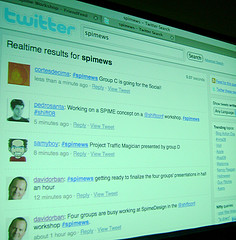The Twitterless Social Media Panel at Blog World Expo (or “A Break From the Backchannel”)
I organized and moderated the “Social Media: The Bad and The Ugly” panel at Blog World & New Media Expo last October (see my recap). It had a wonderful lineup featuring Amber Naslund, Director of Community at Radian6 and blogger at Altitude Branding; Wayne Sutton, Partner at OurHashtag and blogger at SocialWayne.com and Robert Scoble, Managing Director at Building43.com at Rackspace and blogger at Scobleizer.
If you’ve attended a lot of panels or presentations in this space, one thing you notice more and more is the backchannel and the influence it has (or doesn’t have) on the presentation in question. Sometimes this is beyond the speaker’s control, perhaps they are surprised by a massive scrolling screen of messages behind them. These days, this is often powered by a Twitter search.
Other times, a speaker may make it a point to monitor Twitter and make adjustments based on what is being said about his or her presentation or answer questions that are being posed. This isn’t a good or a bad thing, necessarily – it all depends on the situation, the speaker and what they are comfortable with.
As much as I love Twitter, I find that this sort of listening is sometimes counter-productive. Power to the people is cool in all… but, sometimes, you have to have a little distance and an understanding of who is leading the sessions. It’s cool that people have a voice, but if you are a professional here to give a presentation, at least some people expect your attention in giving said presentation, not in monitoring a stream of text messages and reactions to the presentation. For some speakers, it may be a little unnerving, which is natural.
Heading to Blog World Expo, I knew that there would be a lot of speakers who would be monitoring the Twitter streams of their panel or presentation and addressing what was being said. Again, that’s not a bad thing; it’s just a thing. But, a few days before our panel, I decided that I wanted to take a step back.
What I decided was that I wanted to ignore Twitter during our talk. I’d give people a hashtag and tell them to post their thoughts and that we would definitely read them after the talk had completed. If possible, I didn’t want anyone on the panel with a laptop open or a mobile phone monitoring the stream. I wanted to focus on delivering the talk and interacting with the people sitting in front of us on a face to face basis; not so much their tweets. I wanted to look people in the eyes and give a good presentation for them and answer their questions.
I didn’t want to be looking at screens, reading short text messages posted on Twitter and interrupting the talk to adjust or answer them.
At pretty much any other conference, this wouldn’t really matter. But, at a conference focused on blogging and social media, I thought it would be an interesting and curious step; especially to announce it to the panel attendees at the start.
Of course, this wasn’t my decision alone. I had to run it by my fellow prolific Twitter users and panelists. Amber and Wayne readily agreed, but Robert was, of course, constantly surrounded by people. Minutes before we were set to start, I was able to share the idea with him and he quickly agreed. It was great to have everyone on board with it.
I have to say, I think it went really well. And not only that, but the feedback I received from attendees told me it went really well. We provided a hashtag and then that was it as far as monitoring Twitter. We went through our entire talk and it went terrifically. We had a great, unspoken chemistry. And then we took questions, answered them and closed the session out.
There was one moment where a Twitter message was referenced, as Amber did look at Twitter and felt the need to correct something that was said about one of her statements. But, after that, we returned right back to the talk.
After the panel was over and I was done talking to people, I pulled out my laptop and read all of the Twitter messages that had been sent, responding to pretty much all of them, even if it was just to say thank you.
All in all, I was really happy. For me, there are a couple of different lessons. Twitter is awesome, but don’t let it take over. Opinions are cool, but don’t let the opinions of others prevent you from doing what you came to do or what you think might be interesting. Steve Jobs said it best:
“Your time is limited, so don’t waste it living someone else’s life. Don’t be trapped by dogma – which is living with the results of other people’s thinking. Don’t let the noise of other’s opinions drown out your own inner voice. And most important, have the courage to follow your heart and intuition. They somehow already know what you truly want to become. Everything else is secondary.”

